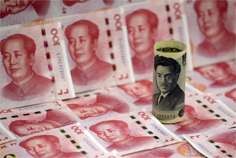
Yuan extends losses on Tuesday but yen surges after bomb attack at Brussels airport
US dollar firms up against most other currencies on reports of more Fed moves later in the year
The yuan extended its losses on Tuesday to hit a one-week-low against the US dollar which bounced back this week against most other currencies, barring the yen after a terrorist attack in Brussels during the afternoon.
Offshore yuan fell to 6.4960 to the US dollar in early afternoon trade, down 0.2 per cent from Monday when it dropped 0.33 per cent which was the biggest single day drop in seven weeks. It bounced back to 6.4928 in the evening, but was still down 0.15 per cent.
The currency has fallen by 0.5 per cent in the first two trading days of this week after hitting a four-month high of 6.4816 on Friday.

Innes said these comments “stopped the US dollar bears in their tracks.”
“I’m not in that court given global economic uncertainty, it’s highly doubtful the Fed is going to move in April, and I still believe there is a less than 50 per cent chance they will hike rates in June. If this scenario holds true it should weigh negatively for US dollar prospects through mid-2016.” he added.
While the yuan fell against the greenback, the Japanese yen rose on Tuesday by 0.44 per cent to the US dollar at 111.45, compared with a drop of 0.34 per cent on Monday.
Innes said there was strong selling pressure in the US dollar against the yen more as a risk-off trade after the bomb attack at the Brussels Airport.
I still believe there is a less than 50 per cent chance they will hike rates in June. If this scenario holds true it should weigh negatively for US dollar prospects through mid-2016
“Heavy selling was seen in the US dollar against the yen after the bombing due to unanticipated risks in the aftermath of the terrorist attack,” he said.
The People’s Bank of China on Tuesday fixed the reference rate for the yuan weaker for a second day at 6.4971 against the US dollar, down 0.23 per cent from Monday when the central bank had set the mid price 0.3 per cent stronger. Traders can trade up to 2 per cent in each direction of the mid price.
Onshore yuan was down 0.15 per cent at 6.4940 in afternoon trade on Tuesday, after falling 0.2 per cent on Monday. The currency also reversed course from Friday when it had its biggest single-day jump in a month to hit a three-month high of 6.4595 to the US dollar on Friday morning.
The short-term yuan rally last week came after the US dollar fell following Federal Reserve chairwoman Janet Yellen’s decision to keep interest rates unchanged and slow down rate increases this year.
The Hong Kong dollar rose to 7.7537 against the greenback on Tuesday, same as on Monday and is nearing the year’s strongest level of 7.7503.

